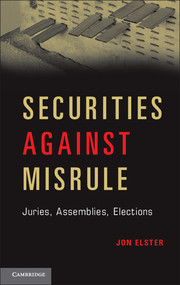Book contents
- Frontmatter
- Contents
- Preface and Acknowledgments
- Introduction
- 1 The Normative Study of Collective Decision Making
- 2 Ignorance, Secrecy, and Publicity in Jury Decision Making
- 3 A Dialogue with Bentham
- 4 The Optimal Design of Constituent Assemblies
- 5 Cross-Voting: A Study in Failure
- Conclusion
- References
- Index
- References
5 - Cross-Voting: A Study in Failure
Published online by Cambridge University Press: 05 March 2013
- Frontmatter
- Contents
- Preface and Acknowledgments
- Introduction
- 1 The Normative Study of Collective Decision Making
- 2 Ignorance, Secrecy, and Publicity in Jury Decision Making
- 3 A Dialogue with Bentham
- 4 The Optimal Design of Constituent Assemblies
- 5 Cross-Voting: A Study in Failure
- Conclusion
- References
- Index
- References
Summary
INTRODUCTION
In this chapter I discuss cross-voting as an electoral device for promoting what Bentham called “moral aptitude” in deputies. More specifically, the device is intended to prevent the election of extremists and favor that of moderate candidates. In recent discussions, the term “centripetal” is often used about institutions designed for that purpose. For instance, members of group A may delegate to another group B the power or some of the power to choose the representatives of group A. The process can also involve more than two groups. As we shall see, there are many other variations on the same general theme. The main variation is quantitative, in the following sense: in the election of representatives for group A, the proportion of voters who belong to group A may vary from 0 (Brittany 1576, 1614) through 1/6 (Maryland 1789), 1/3 (Georgia 1789, France 1484, 1789), to some number between 1/2 and 1 (proposed scheme for Belgium).
This general idea has been adopted or proposed independently at many times and places, ranging from the foundation of Rome to Belgian politics in the 21st century. The idea seems to be intrinsically attractive, especially – but not only – in societies divided along the lines of estate or ethnicity. In the words of one scholar, “the fact that so many different countries and conflicts have made recourse to the basic ideas of cross voting, often without reference to or apparent knowledge of the experience of others, is a testament to the recurring appeal of this idea.”
- Type
- Chapter
- Information
- Securities against MisruleJuries, Assemblies, Elections, pp. 236 - 271Publisher: Cambridge University PressPrint publication year: 2013



